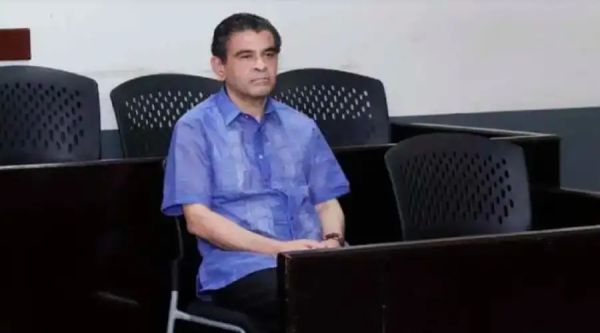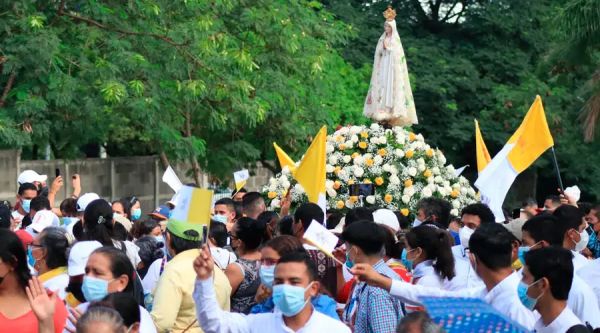The prelate remained under house arrest until Feb. 10, when he was sentenced to 26 years and four months in prison for “treason.” A day earlier, Álvarez refused to leave the country with 222 other political prisoners who were being deported by the dictatorship to the United States, including four priests, a deacon, and two seminarians.
The sentence was received with great concern by Pope Francis, who dedicated a few words to the imprisoned bishop after the Angelus two days later.

As far as is known, Álvarez is held in La Modelo prison. At the beginning of July there was an attempt to get him released. However, negotiations between the regime and the Church in Nicaragua failed, and the bishop was sent back to prison.
On Aug. 19, one year after the prelate’s violent arrest, the U.S. State Department called for his immediate release.
The Inter-American Commission on Human Rights (IACHR) and the Office of the United Nations High Commissioner for Human Rights for Central America and the English Caribbean (OHCHR) condemned “the continuing violations of his human rights, such as the lack of access to medical care and essential medicines, the solitary confinement he has been subjected to since his detention at La Modelo prison, and the limited family visits that he has been allowed.”
According to Molina’s report on the persecuted Church, since the 2018 crisis began, there have been 193 attacks against bishops, priests, deacons, seminarians, and women religious. These include constant surveillance, threats, attempted murders, beatings, criminal proceedings, and exile.
The report, updated to March of this year, states that a bishop (Silvio Báez), 13 priests, and two deacons have been forced into exile. In addition, the apostolic nuncio and two priests were expelled, while five priests, a deacon, and two seminarians were exiled.
5. Freedom of worship: Can Catholics still go to Mass in Nicaragua?
Given this panorama, the question arises as to whether the faithful can continue to worship freely in Nicaragua.
In an Aug. 22 statement to ACI Prensa, CNA’s Spanish-language news partner, Molina explained that “the parishes are under surveillance 24 hours a day by infiltrators who generally belong to the Council of Citizen Power, which is a group of people in charge of monitoring opponents and including them on a list,” which is then handed over to the police.
In addition, the priests Tomás Sergio Zamora Calderón and William Mora were prohibited by the regime from returning to Nicaragua after having participated in World Youth Day in Lisbon, Portugal, in early August.
In this sense, Molina explained, Catholics can participate in Masses and celebrate sacraments such as baptisms and marriages, “but they are always monitored.”
“In fact, the homilies of the priests are always recorded and sent to what is known as El Carmen, which is the place where the dictatorial couple Ortega-Murillo lives” and where the sermons of the parish priests are analyzed.
Regarding processions, she noted that for Holy Week 2023 “more than 3,176 processions were prohibited” in the streets. This meant that these expressions of faith had to be held inside the churches.

Although there were reactions from the faithful, as in the procession of the Virgin of Mercy in 2022, the reality is that the regime uses its available means to prevent them.
Molina explained that the prohibition of holding processions in the streets had already been given before the Holy Week 2023 and also after it. Although there were some exceptions, “such as the celebration of St. Dominic that takes place in Managua,” this was due to the fact that it is a very heavily attended festival where people also go to drink liquor and have fun.
“So, for tourism reasons, that procession was allowed, but the rest of them are being prohibited,” she said.
The Nicaraguan researcher also noted that the officials try not to notify the prohibitions in writing but do so through “courtesy visits” in which they verbally inform the parish priests that “they cannot hold the processions.”
“It has also been forbidden to mention Bishop Rolando Álvarez in Masses and in prayers,” Molina said. She reported that lay groups, priests, and seminarians secretly pray for the bishop, “because whoever mentions him in the homily, at Mass … is immediately visited by the police” and may even be arrested.
6. Official pronouncements of the Nicaraguan bishops
The Nicaraguan Bishops’ Conference is notable for its concern for national life and on several occasions, it has released statements on elections or other events of public interest.
However, when their position has not been to the liking of the regime, the dictatorship has responded with accusations and verbal attacks.
Despite this situation, the Church reiterated in November 2021 its offer to mediate between the opposition and the regime in order to resolve the political crisis, but Ortega rejected it.
Regarding Álvarez’s situation, the bishops issued a statement Aug. 20, 2022, the day after he was forcibly removed from the diocesan chancery in Matagalpa, stating that they were “deeply pained” by “this wound” suffered by the Church in Nicaragua.
The ACN Report
On June 22, the pontifical foundation Aid to the Church in Need (ACN) presented its 2023 Report on Religious Freedom in which it noted that the persecution of the Church in Nicaragua “has a political and not religious motivation.”
This is because since 2018, when the current crisis broke out, “the Church has openly criticized any repression of civil liberties and the violation of human rights in the country.”
The ACN report on Nicaragua indicates that religious freedom in the Central American country “has visibly worsened.”
“The prospects for human rights, including religious freedom, are deeply troubling and negative,” the report concludes.
This story was first published by ACI Prensa, CNA’s Spanish-language news partner. It has been translated and adapted by CNA.
